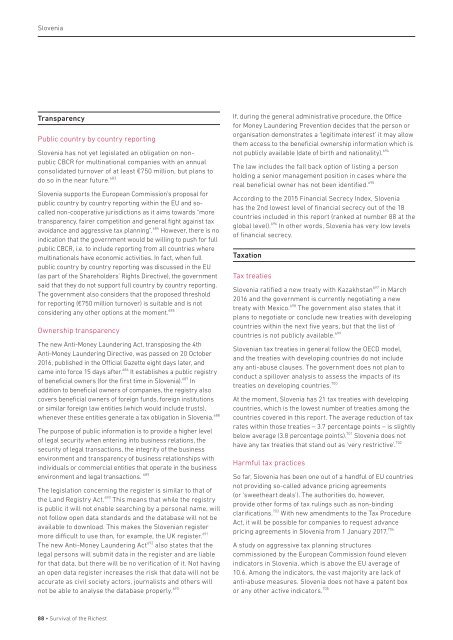You also want an ePaper? Increase the reach of your titles
YUMPU automatically turns print PDFs into web optimized ePapers that Google loves.
Slovenia<br />
Transparency<br />
Public country by country reporting<br />
Slovenia has not yet legislated an obligation on nonpublic<br />
CBCR for multinational companies with an annual<br />
consolidated turnover <strong>of</strong> at least €750 million, but plans to<br />
do so in <strong>the</strong> near future. 683<br />
Slovenia supports <strong>the</strong> European Commission’s proposal for<br />
public country by country reporting within <strong>the</strong> EU and socalled<br />
non-cooperative jurisdictions as it aims towards “more<br />
transparency, fairer competition and general fight against tax<br />
avoidance and aggressive tax planning”. 684 However, <strong>the</strong>re is no<br />
indication that <strong>the</strong> government would be willing to push for full<br />
public CBCR, i.e. to include reporting from all countries where<br />
multinationals have economic activities. In fact, when full<br />
public country by country reporting was discussed in <strong>the</strong> EU<br />
(as part <strong>of</strong> <strong>the</strong> Shareholders’ Rights Directive), <strong>the</strong> government<br />
said that <strong>the</strong>y do not support full country by country reporting.<br />
The government also considers that <strong>the</strong> proposed threshold<br />
for reporting (€750 million turnover) is suitable and is not<br />
considering any o<strong>the</strong>r options at <strong>the</strong> moment. 685<br />
Ownership transparency<br />
The new Anti-Money Laundering Act, transposing <strong>the</strong> 4th<br />
Anti-Money Laundering Directive, was passed on 20 October<br />
2016, published in <strong>the</strong> Official Gazette eight days later, and<br />
came into force 15 days after. 686 It establishes a public registry<br />
<strong>of</strong> beneficial owners (for <strong>the</strong> first time in Slovenia). 687 In<br />
addition to beneficial owners <strong>of</strong> companies, <strong>the</strong> registry also<br />
covers beneficial owners <strong>of</strong> foreign funds, foreign institutions<br />
or similar foreign law entities (which would include trusts),<br />
whenever <strong>the</strong>se entities generate a tax obligation in Slovenia. 688<br />
The purpose <strong>of</strong> public information is to provide a higher level<br />
<strong>of</strong> legal security when entering into business relations, <strong>the</strong><br />
security <strong>of</strong> legal transactions, <strong>the</strong> integrity <strong>of</strong> <strong>the</strong> business<br />
environment and transparency <strong>of</strong> business relationships with<br />
individuals or commercial entities that operate in <strong>the</strong> business<br />
environment and legal transactions. 689<br />
The legislation concerning <strong>the</strong> register is similar to that <strong>of</strong><br />
<strong>the</strong> Land Registry Act. 690 This means that while <strong>the</strong> registry<br />
is public it will not enable searching by a personal name, will<br />
not follow open data standards and <strong>the</strong> database will not be<br />
available to download. This makes <strong>the</strong> Slovenian register<br />
more difficult to use than, for example, <strong>the</strong> UK register. 691<br />
The new Anti-Money Laundering Act 692 also states that <strong>the</strong><br />
legal persons will submit data in <strong>the</strong> register and are liable<br />
for that data, but <strong>the</strong>re will be no verification <strong>of</strong> it. Not having<br />
an open data register increases <strong>the</strong> risk that data will not be<br />
accurate as civil society actors, journalists and o<strong>the</strong>rs will<br />
not be able to analyse <strong>the</strong> database properly. 693<br />
If, during <strong>the</strong> general administrative procedure, <strong>the</strong> Office<br />
for Money Laundering Prevention decides that <strong>the</strong> person or<br />
organisation demonstrates a ‘legitimate interest’ it may allow<br />
<strong>the</strong>m access to <strong>the</strong> beneficial ownership information which is<br />
not publicly available (date <strong>of</strong> birth and nationality). 694<br />
The law includes <strong>the</strong> fall back option <strong>of</strong> listing a person<br />
holding a senior management position in cases where <strong>the</strong><br />
real beneficial owner has not been identified. 695<br />
According to <strong>the</strong> 2015 Financial Secrecy Index, Slovenia<br />
has <strong>the</strong> 2nd lowest level <strong>of</strong> financial secrecy out <strong>of</strong> <strong>the</strong> 18<br />
countries included in this report (ranked at number 88 at <strong>the</strong><br />
global level). 696 In o<strong>the</strong>r words, Slovenia has very low levels<br />
<strong>of</strong> financial secrecy.<br />
Taxation<br />
Tax treaties<br />
Slovenia ratified a new treaty with Kazakhstan 697 in March<br />
2016 and <strong>the</strong> government is currently negotiating a new<br />
treaty with Mexico. 698 The government also states that it<br />
plans to negotiate or conclude new treaties with developing<br />
countries within <strong>the</strong> next five years, but that <strong>the</strong> list <strong>of</strong><br />
countries is not publicly available. 699<br />
Slovenian tax treaties in general follow <strong>the</strong> OECD model,<br />
and <strong>the</strong> treaties with developing countries do not include<br />
any anti-abuse clauses. The government does not plan to<br />
conduct a spillover analysis to assess <strong>the</strong> impacts <strong>of</strong> its<br />
treaties on developing countries. 700<br />
At <strong>the</strong> moment, Slovenia has 21 tax treaties with developing<br />
countries, which is <strong>the</strong> lowest number <strong>of</strong> treaties among <strong>the</strong><br />
countries covered in this report. The average reduction <strong>of</strong> tax<br />
rates within those treaties – 3.7 percentage points – is slightly<br />
below average (3.8 percentage points). 701 Slovenia does not<br />
have any tax treaties that stand out as ‘very restrictive’. 702<br />
Harmful tax practices<br />
So far, Slovenia has been one out <strong>of</strong> a handful <strong>of</strong> EU countries<br />
not providing so-called advance pricing agreements<br />
(or ‘swee<strong>the</strong>art deals’). The authorities do, however,<br />
provide o<strong>the</strong>r forms <strong>of</strong> tax rulings such as non-binding<br />
clarifications. 703 With new amendments to <strong>the</strong> Tax Procedure<br />
Act, it will be possible for companies to request advance<br />
pricing agreements in Slovenia from 1 January 2017. 704<br />
A study on aggressive tax planning structures<br />
commissioned by <strong>the</strong> European Commission found eleven<br />
indicators in Slovenia, which is above <strong>the</strong> EU average <strong>of</strong><br />
10.6. Among <strong>the</strong> indicators, <strong>the</strong> vast majority are lack <strong>of</strong><br />
anti-abuse measures. Slovenia does not have a patent box<br />
or any o<strong>the</strong>r active indicators. 705<br />
88 • <strong>Survival</strong> <strong>of</strong> <strong>the</strong> <strong>Richest</strong>


